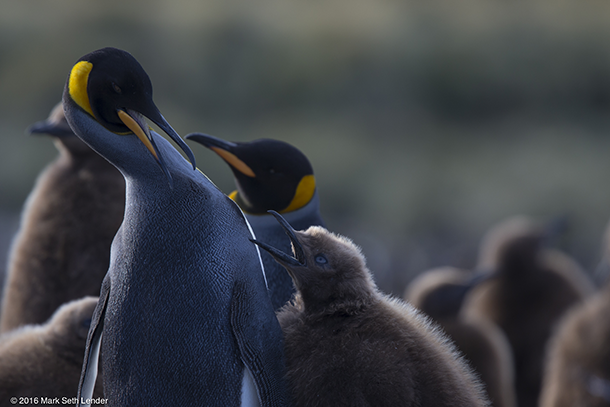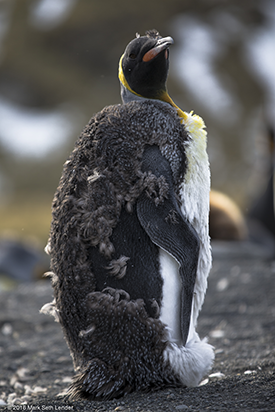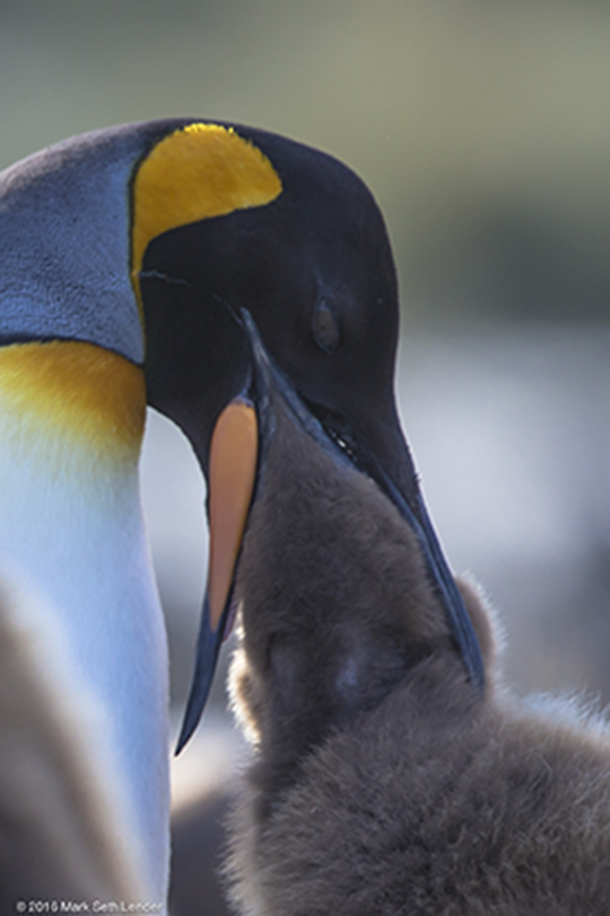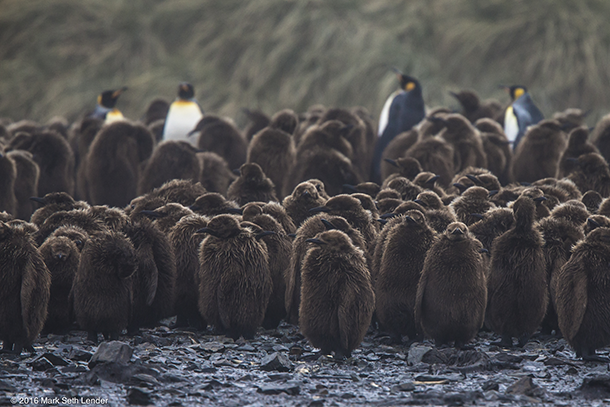King Penguin Chicks Hunger for More
Air Date: Week of May 13, 2016

A King penguin parent has no more food to offer its “Oakum Boy” chick (Photo: Mark Seth Lender)
Living on Earth’s resident explorer Mark Seth Lender visited a King Penguin nesting colony on South Georgia Island in the South Pacific. Early whalers called the chicks ‘Oakum Boys’ because their tan-colored coats reminded the sailors of the tarred cotton twine used for caulking. Mark comments on the hunger of the Oakum Boys, as they shed their downy feathers and their parents stop feeding them, so the juveniles can learn to find their own food.
Transcript
CURWOOD: Way down in the south Atlantic, it’s been nesting season for penguins, and Living on Earth’s resident explorer Mark Seth Lender had the chance to experience this first hand. On the remote shores of South Georgia Island, he found King Penguins and saw for himself a distinction between adults and juveniles. They look so different, that early observers thought they were distinct species, indeed whalers called the babies “Oakum Boys”, for their tan-colored coats that reminded the men of the tarred cotton twine used for caulking. Here’s Mark’s essay.

It’s the time of the season for penguin chicks to molt their soft, downy brown feathers (Photo: Mark Seth Lender)
The Oakum Boys
King Penguins
Gold Harbor, South Georgia Island
© 2016 Mark Seth Lender
All Rights Reserved
[SOUNDS OF PENGUIN COLONY]
LENDER: The Oakum Boys stand in a huddle, hanging around, hanging around, whistling for their supper. Their King Penguin Mothers and King Penguin Fathers have business of their own, standing around standing around, waiting for new feathers. Like curled fall leaves, like peach-colored snow, tiny worn-out plumes litter the ground washing down in rivulets on to the sand, into the sea. Land bound in their state of near undress, the mothers and the fathers cannot follow. The high wee whistling of Oakum Boys will continue for a while. For this is the time of fasting.
[YOUNG PENGUINS WHISTLING]
Here, or there, Oakum Boy’s persistence earns a meal. Late-molting King Penguin Father or early molted King Penguin Mother files through the surf, returning with a crop full: squid and little lantern fishes that glow and rise from the deeps in the dark of the Southern Ocean. Lucky the Oakum Boy with her hunger at the right time, right… there: She pecks her Penguin Father’s or Penguin Mother’s bill and stretches high as she can. And the meal comes up, the long parenting mouth grasps around; the meal goes, straight on down, and baby hungers for more -

An Oakum Boy succeeds in getting a rare meal (Photo: Mark Seth Lender)
- There will be no more. Not ever.
The Mothers and the Fathers are all done. The long weeks have begun of no food for self, or other. They tap-tap-tap the Oakum Boys on their brown downy heads: Enough is enough they say. And the mothers and fathers lean away. For the Oakum Boys are changing, exchanging down for feathers; and the only sup will be that they garner on their own, now, and forever.
[PENGUIN COLONY SOUNDS]
CURWOOD: Mark recorded these hungry Oakum Boys and their royal mothers and fathers on South Georgia Island -- and to see his portraits of the chicks snagging a meal, waddle your way to LOE.Org.

The Oakum Boys chicks stand around waiting for a meal that won’t come (Photo: Mark Seth Lender)
Links
Living on Earth wants to hear from you!
Living on Earth
62 Calef Highway, Suite 212
Lee, NH 03861
Telephone: 617-287-4121
E-mail: comments@loe.org
Newsletter [Click here]
Donate to Living on Earth!
Living on Earth is an independent media program and relies entirely on contributions from listeners and institutions supporting public service. Please donate now to preserve an independent environmental voice.
NewsletterLiving on Earth offers a weekly delivery of the show's rundown to your mailbox. Sign up for our newsletter today!
 Sailors For The Sea: Be the change you want to sea.
Sailors For The Sea: Be the change you want to sea.
 The Grantham Foundation for the Protection of the Environment: Committed to protecting and improving the health of the global environment.
The Grantham Foundation for the Protection of the Environment: Committed to protecting and improving the health of the global environment.
 Contribute to Living on Earth and receive, as our gift to you, an archival print of one of Mark Seth Lender's extraordinary wildlife photographs. Follow the link to see Mark's current collection of photographs.
Contribute to Living on Earth and receive, as our gift to you, an archival print of one of Mark Seth Lender's extraordinary wildlife photographs. Follow the link to see Mark's current collection of photographs.
 Buy a signed copy of Mark Seth Lender's book Smeagull the Seagull & support Living on Earth
Buy a signed copy of Mark Seth Lender's book Smeagull the Seagull & support Living on Earth

